Speech Therapy in Saint-Laurent Montreal · Supporting Communication and Growth in a Multilingual Community


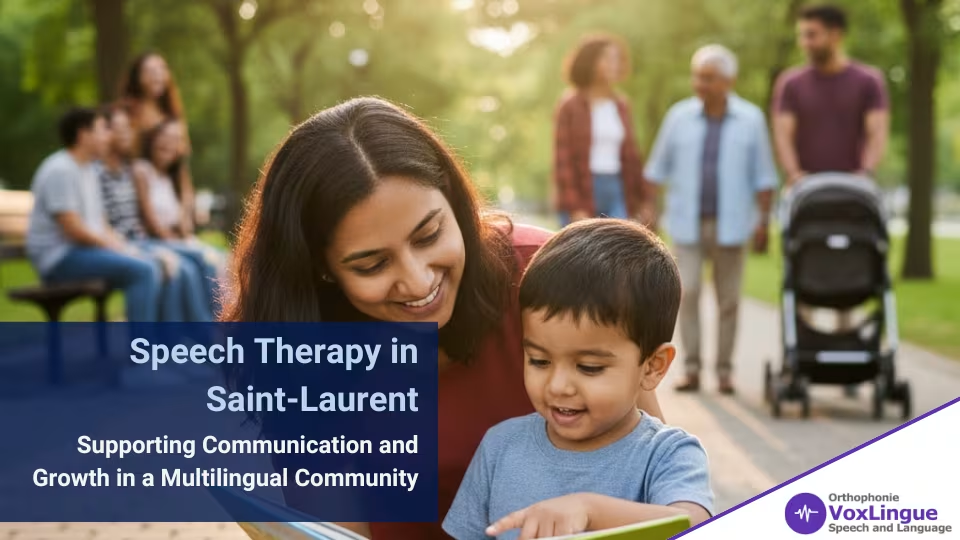
Saint-Laurent is a vibrant and diverse borough within Montreal, known for its welcoming atmosphere and multicultural spirit. Families here often speak more than one language at home, and it is common for children to grow up hearing French, English, and other languages in their daily lives. This richness of language and culture is one of the borough’s greatest strengths, shaping how children learn to communicate and how families connect with one another.
In such a dynamic environment, communication takes many forms. Children may learn to switch easily between languages depending on who they are speaking to, while adults often adapt their language use at work, at school, or in social settings. This ability to navigate different languages is a wonderful skill, yet it can also lead parents to wonder whether their child’s speech and language development is progressing as expected.

Speech therapy offers guidance and support in these situations. It helps families understand what is typical in multilingual language development and provides tools to encourage communication growth. Whether a child is learning to express their first words or an adult wishes to refine pronunciation and clarity, speech therapy focuses on helping individuals find confidence in their voice.
At Orthophonie VoxLingue, we offer assessments and individualized support that reflect the realities of a bilingual and multicultural community. Our goal is to help every client strengthen communication in a way that respects their family’s unique linguistic background while promoting clarity, understanding, and connection.
Saint-Laurent is one of Montreal’s most linguistically and culturally diverse boroughs. Families from around the world have made it their home, creating a community where multiple languages are heard in classrooms, parks, and cafés every day. According to the City of Montreal, more than seventy percent of residents speak a language other than French or English at home. This cultural mosaic makes Saint-Laurent a fascinating environment for studying and nurturing bilingual and multilingual development in both children and adults.
For children, growing up in such a community offers the unique opportunity to experience language as a bridge between cultures. Exposure to multiple languages supports cognitive flexibility, problem-solving, and empathy. It also gives children a strong foundation for future learning. Research shows that bilingual individuals often demonstrate enhanced attention skills and a deeper understanding of how language works.
The borough is also a hub for education and lifelong learning. Institutions such as Vanier College and Cégep de Saint-Laurent contribute to the academic and cultural vitality of the area, offering programs that attract students from all backgrounds. These schools reflect the community’s commitment to fostering knowledge and communication across generations.
Beyond its schools, Saint-Laurent is filled with spaces that promote connection and shared experiences. Families gather in Parc Beaudet and Parc Marcel-Laurin for community events, outdoor play, and conversations that flow naturally between languages. Local libraries and community centers play an equally important role by offering early childhood literacy activities, parent-child workshops, and cultural programming designed to bring people together through learning and communication.
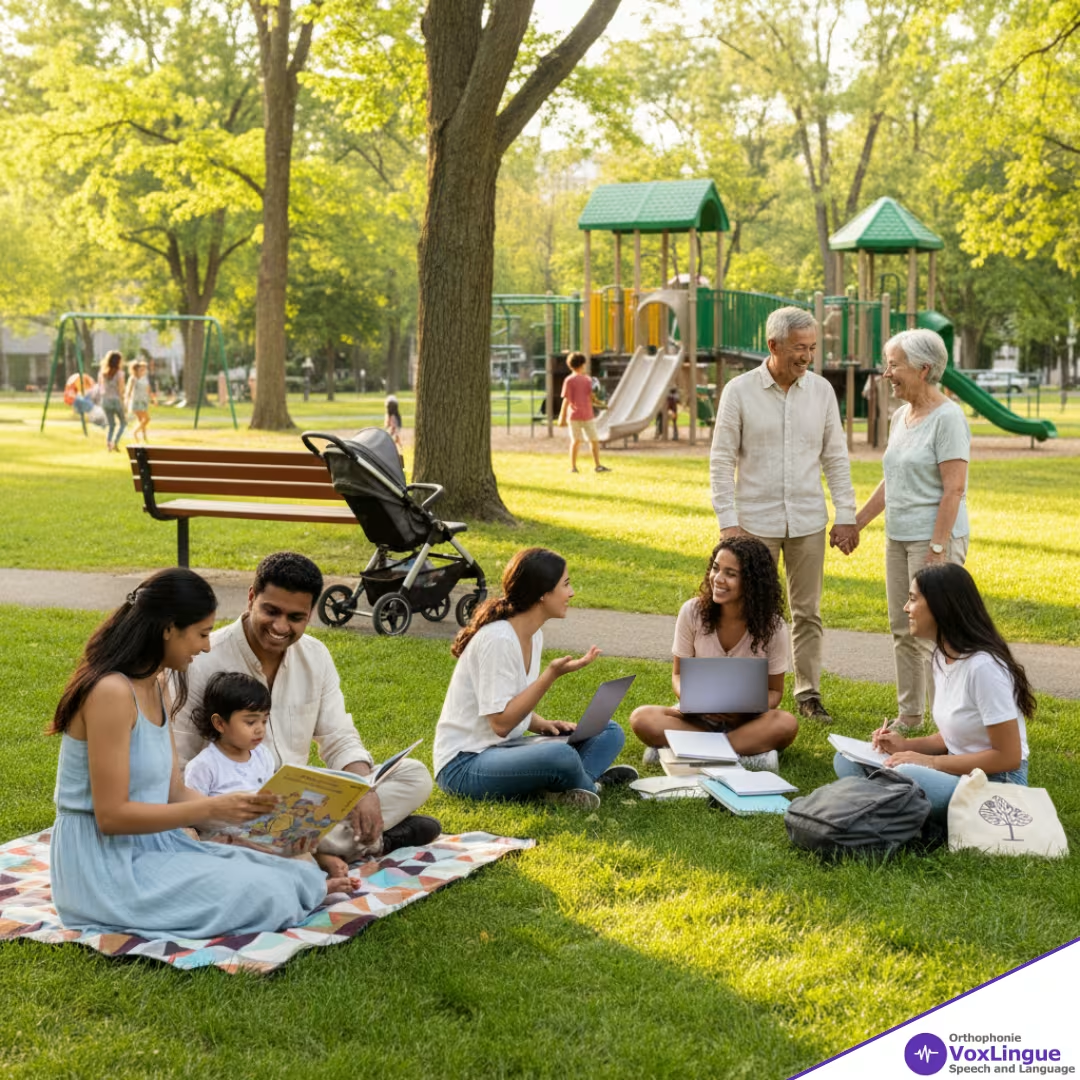
This environment encourages families to value language not only as a tool for speaking and understanding but as a way to build relationships and community. In Saint-Laurent, every word, story, and conversation reflects the borough’s shared belief that language connects people.
To learn more about local resources, visit the official City of Montreal page for Saint-Laurent which highlights its services, events, and community initiatives.
Early communication development lays the foundation for how children learn, think, and connect with others. For families in multilingual communities like Saint-Laurent, understanding how children acquire language in more than one tongue can be both fascinating and reassuring. Each child’s path to speech and language growth may look a little different, especially when they are exposed to two or more languages at home.
It is common for bilingual children to mix words from different languages when they speak. This process, known as code-switching, is a normal and healthy part of bilingual development. It shows that the child is learning to manage two linguistic systems and to use whichever word comes most easily in the moment. Over time, as their language skills strengthen, children learn to separate the languages more naturally depending on who they are speaking to and in what setting.
Consistent exposure and rich interaction in both languages are key to long-term success. Speaking, reading, and playing in each language helps children build vocabulary, strengthen grammar, and develop social confidence. Studies show that bilingualism supports cognitive flexibility and may enhance skills such as memory and problem-solving. For parents, this means that fostering both languages at home contributes not only to communication but also to overall learning and emotional development.
When questions arise about whether a child’s language development is following a typical path, speech therapy can offer valuable guidance. A speech-language pathologist focuses on the child’s ability to communicate effectively, not just on pronunciation or vocabulary in a single language. Therapy is tailored to the child’s background and family context, making it especially adaptable to bilingual or multilingual homes.

For parents interested in learning more about how to recognize typical bilingual development and potential language difficulties, we recommend reading Identifying Language Disorders in Bilingual Children which provides practical insights and examples grounded in current research.
Parents play an essential role in nurturing their child’s communication skills. The most effective language learning happens naturally through everyday interactions, routines, and shared experiences. In a multilingual community like Saint-Laurent, families have the added opportunity to make language learning both meaningful and culturally rich.
One of the simplest and most powerful ways to support language growth is through reading aloud. Whether it is in French, English, or another language spoken at home, reading stories helps children develop listening comprehension, expand their vocabulary, and learn how sentences are structured. The language of the book is less important than the connection it creates between parent and child. Regular reading also teaches children that language can be a source of joy and imagination.
Encouraging children to tell stories about their day is another valuable practice. When a child recounts an event, they practice organizing their thoughts, using descriptive words, and expressing emotions. Asking open-ended questions such as “What happened next?” or “How did that make you feel?” helps deepen conversation and promotes more complex language use.
Saint-Laurent also offers many community spaces that support early communication development. The Saint-Laurent Library Network hosts story hours, early literacy activities, and workshops that help children explore language through play and storytelling. These activities also allow parents to observe how their children interact with peers, which can provide helpful insight into social communication skills.
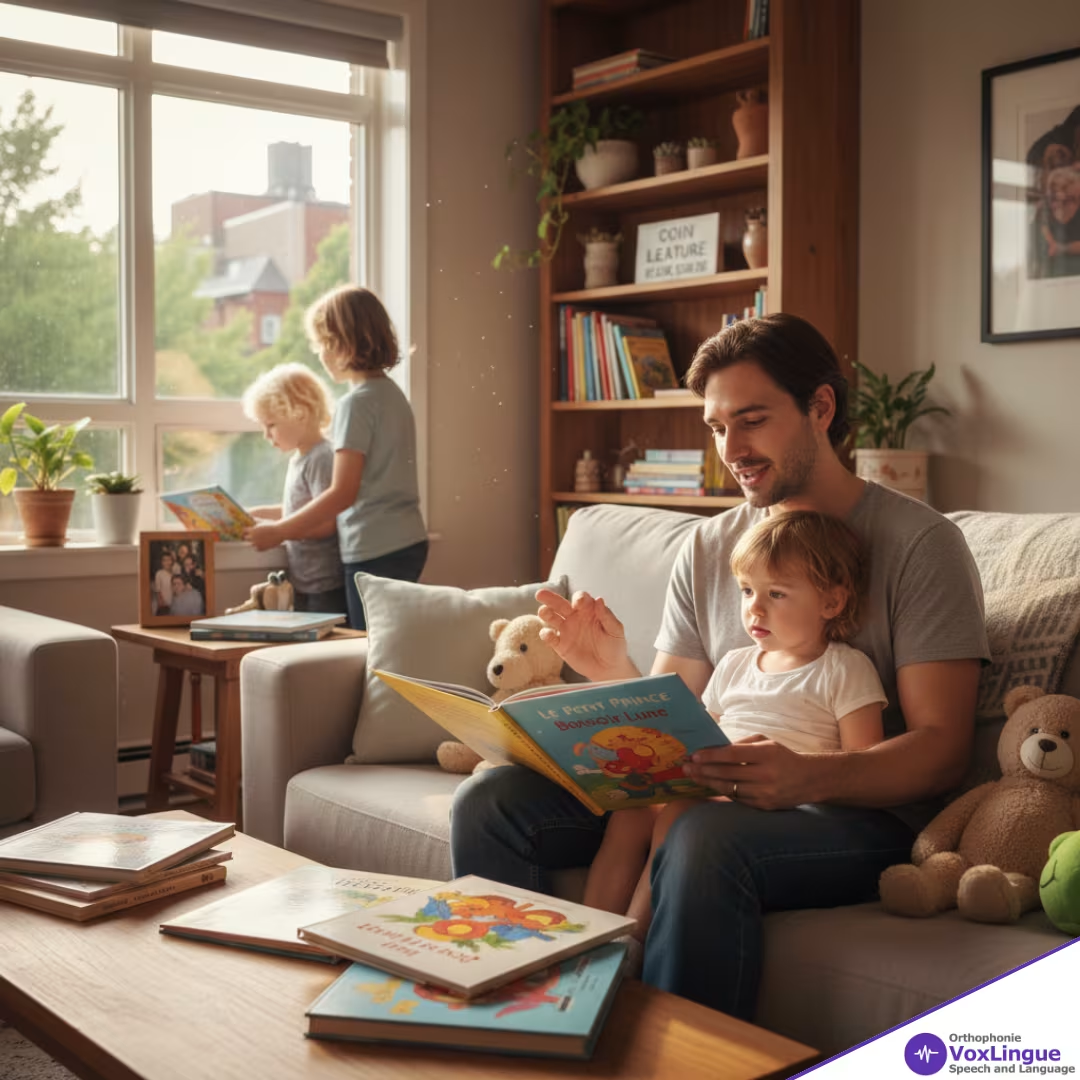
Family cultural centers and community programs across the borough often include music and movement sessions, play-based learning activities, and multilingual events. Participating in these opportunities strengthens both language and social connections while reflecting the values of inclusion and cultural pride that define Saint-Laurent.
By weaving these simple practices into daily life, parents can make language learning a natural and enjoyable part of their child’s world. The key is consistency, engagement, and genuine curiosity about what children have to say. When families create environments that value conversation, storytelling, and shared discovery, children gain the confidence to express themselves fully and to connect meaningfully with others.
Families in Saint-Laurent benefit from living in a community that values language, culture, and education. Yet, it is natural for parents to have questions about how their child’s communication skills are progressing, especially in a bilingual or multilingual environment. Speech therapy provides a supportive and structured way to understand a child’s communication profile and to guide their growth through individualized strategies.
A speech and language assessment is often the first step. During this process, a speech-language pathologist observes how a child listens, understands, and expresses themselves. Assessments are designed to identify strengths as well as areas that may benefit from targeted support. In bilingual families, both languages are taken into consideration to create a complete and accurate picture of development. Understanding how a child communicates across different contexts is essential in determining what type of intervention will be most effective.
Therapy sessions may focus on a variety of goals, such as improving pronunciation, expanding vocabulary, strengthening comprehension, or enhancing social communication skills. Each plan is tailored to the child’s age, interests, and language background, allowing therapy to feel natural and engaging. For example, a child who enjoys stories may work on narrative skills through shared reading, while another who loves games might practice turn-taking and expressive language during play-based activities.
Parents are a vital part of the therapeutic process. When families are given clear strategies to use at home, progress often happens more quickly. Parent coaching helps caregivers learn how to turn everyday moments into opportunities for communication. Activities such as naming household objects, describing actions during play, or narrating daily routines can have a lasting impact on a child’s language development.
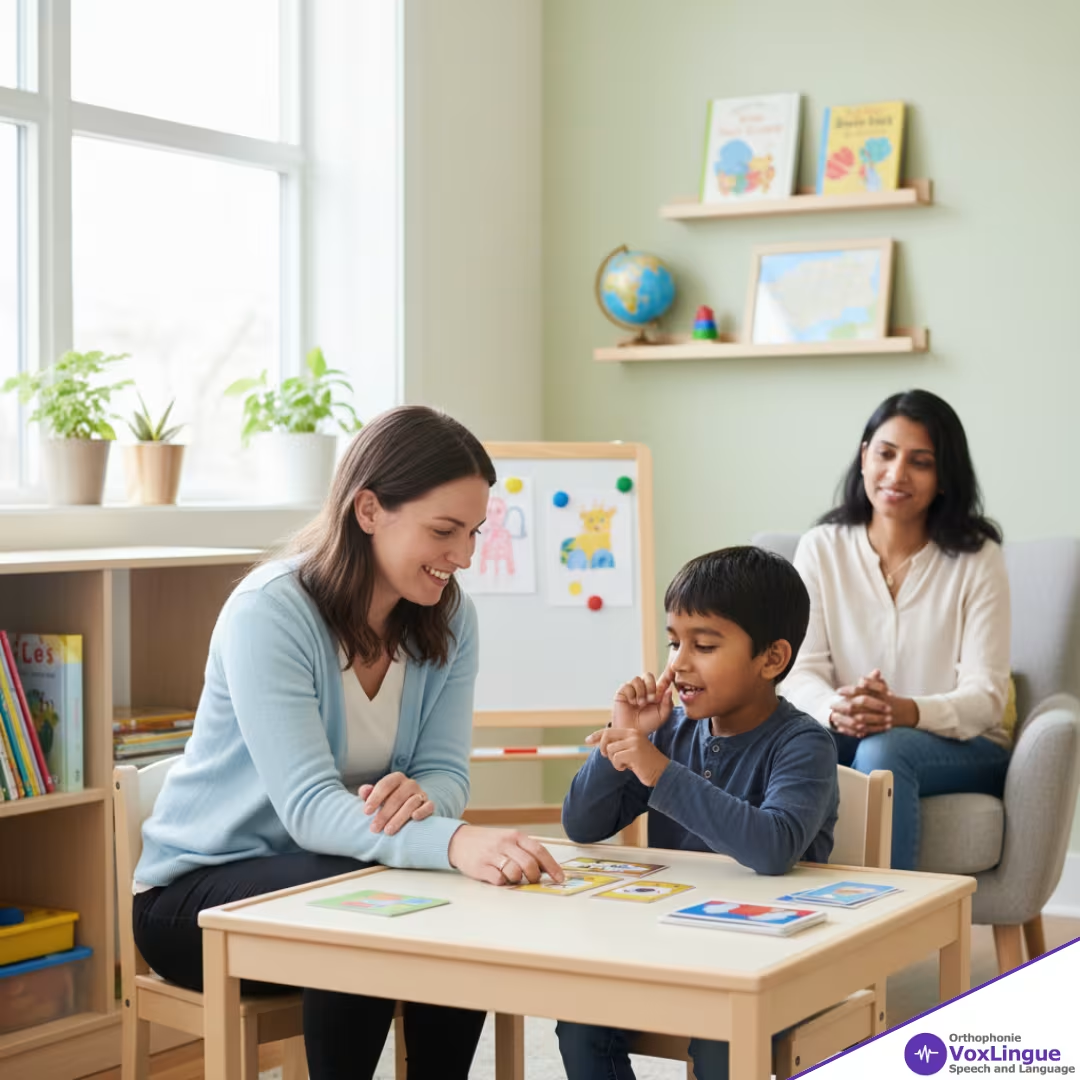
Families who wish to learn more about how therapy is structured and what it can address can visit Speech and Language Treatment for a detailed overview of the approaches used to support communication in bilingual and multilingual families. Speech therapy is ultimately about helping individuals connect with others through language, one meaningful conversation at a time.
Saint-Laurent is a community where many cultures and languages come together every day. Children hear multiple languages at school, in their neighborhoods, and at home, while adults often communicate across linguistic and cultural boundaries in their daily lives. This diversity enriches the borough and creates a setting where communication is central to every interaction. Speech therapy plays an important role in supporting this multilingual landscape by helping individuals develop clarity, understanding, and confidence in how they express themselves.
For children, effective communication is closely tied to academic success and social development. When children can express their ideas clearly, they are better able to participate in class discussions, ask questions, and build relationships with peers. Difficulties in understanding or expressing language can sometimes lead to frustration or withdrawal, but early support can make a significant difference. Speech therapy helps children strengthen the skills that allow them to share their thoughts, listen actively, and engage with others in meaningful ways.
For adults, communication remains a key factor in personal and professional fulfillment. Some individuals may seek speech therapy to refine pronunciation in a second language, while others may work on articulation, fluency, or voice projection to feel more confident at work or in social situations. The goal is not only to improve speech but to help individuals express their identity with ease and authenticity.
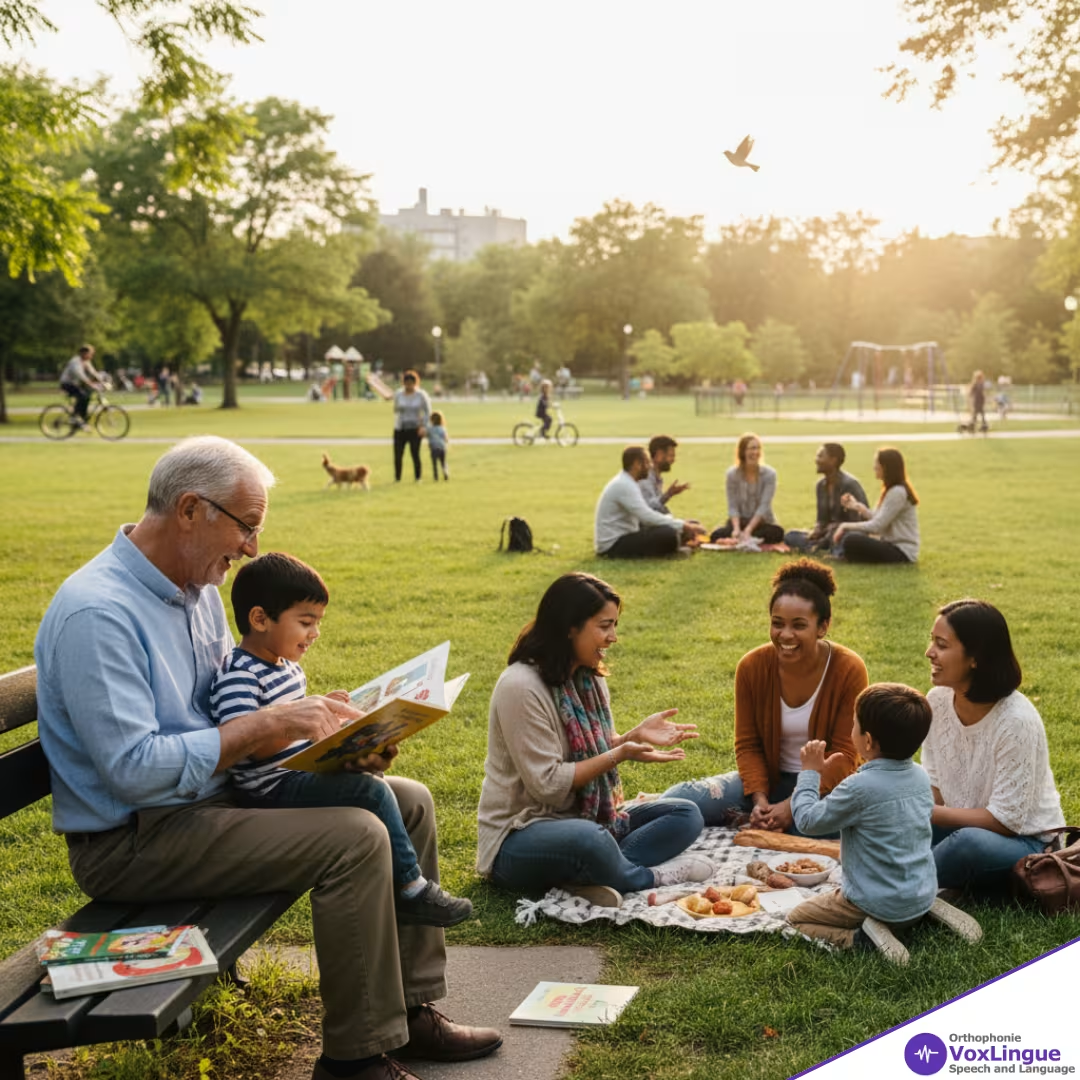
In a borough as linguistically rich as Saint-Laurent, investing in communication has community-wide benefits. When people understand one another clearly, it fosters inclusion, respect, and collaboration. Each conversation becomes an opportunity to build connection across cultures and generations.
Language development and communication skills are deeply influenced by the environments in which people live and learn. The Statistics Canada database provides valuable insights into how linguistic diversity continues to shape Canadian communities, highlighting the importance of supporting communication through education, family involvement, and access to professional care.
By encouraging language growth and open dialogue, Saint-Laurent continues to demonstrate that communication is not only a skill but a shared value that strengthens the fabric of its community.
Saint-Laurent represents the richness of Montreal’s cultural mosaic, where every language and voice contributes to a shared sense of community. Families here often navigate multiple languages in their daily lives, and this creates a beautiful environment for learning and connection. Communication is at the heart of that experience. It allows children to share their thoughts, helps families stay connected across generations, and strengthens the bonds that unite neighbors, schools, and local communities.
Speech therapy can play a meaningful role in celebrating and supporting this diversity. By helping individuals express themselves clearly and confidently, it encourages participation in school, at work, and in social life. For children, it builds the foundation for literacy and academic success. For adults, it reinforces confidence and clarity in both professional and personal interactions. In every case, the goal is not only to improve speech but to foster communication that feels authentic and empowering.

Building communication confidence is a journey that involves patience, practice, and encouragement. It starts at home with conversations, reading, and play. It continues in the community through opportunities to share stories and experiences in more than one language. Each step contributes to a stronger sense of belonging and understanding.
Families who wish to explore more about language development, communication strategies, and bilingualism can visit the VoxLingue Blog for educational articles and insights. Through shared knowledge and awareness, Saint-Laurent continues to grow as a community that values every voice and celebrates the power of communication.